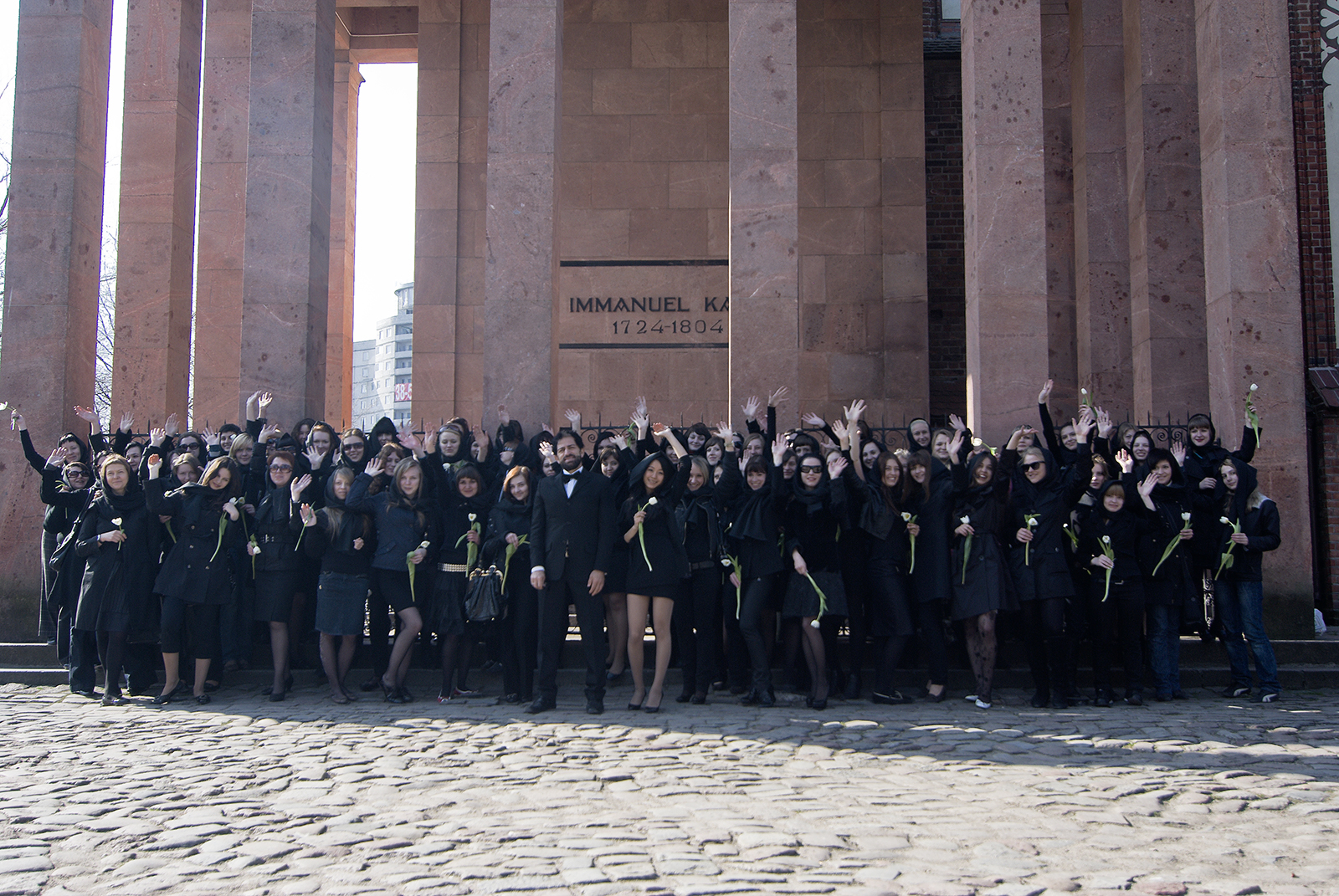
video still
72 "Virgins"/ Kaliningrad #2, 2009
72 "Virgins"/ Kaliningrad #2 is a video and photography installation that explores the complexities of cultural narratives and societal expectations. Co-curated by Elena Tsvetaeva and Yulia Bardun, this thought-provoking project pushes the boundaries of artistic expression and challenges prevailing stereotypes.
The installation features a PAL video, running for 16 minutes, displayed across two channels. It immerses viewers in a mesmerizing visual and auditory experience, highlighting the intersection of religion, love, and social constructs. The vibrant colors and evocative sounds enhance the narrative, inviting viewers to critically reflect on the themes presented.
72 "Virgins": Challenging Stereotypes and Redefining Cultural Narratives
72 "Virgins" is an immersive and thought-provoking artwork that pushes the boundaries of artistic expression and challenges prevailing stereotypes and cultural constructs. This multi-faceted project, co-produced by the National Center for Contemporary Art in Kaliningrad and Moscow, utilizes performance art, video documentation, and photography to engage viewers in a critical dialogue about the concept of the so-called 72 "Virgins" and its cultural implications.
The centerpiece of the artwork is a captivating performance in which artist Shahram Entekhabi assumes the role of a martyr, accompanied by 72 "Virgins" carefully chosen by himself and his parents. Entekhabi's intention is to shed light on the complex intersection of religious teachings, social expectations, and political manipulation. Through this performance, he challenges the conventional narratives surrounding Islam and provides a nuanced and ironic commentary on the concept of martyrdom and its promises.
The performance takes place at Kant's tomb, a symbolic location in Kaliningrad where wedding parties gather to commemorate love and union. Here, Entekhabi disrupts the traditional notions of marriage and rites of passage by reimagining them in the context of martyrdom and paradise. The women, representing a diverse range of body shapes and sizes, are dressed in black attire, reminiscent of the symbolism of mourning in European cultures and the portrayal of female Muslim fanatics.
The accompanying photo series and video documentation further enhance the narrative of 72 "Virgins". The photographs capture the striking imagery of the performance, juxtaposing the black-clad virgins with Kant's tomb and its surroundings. These images challenge viewers to question their preconceived notions and confront the inherent biases and misconceptions perpetuated by society.
Through the lens of irony, the artwork invites viewers to critically examine the construct of the "other" and confront their own cultural frameworks. Entekhabi's clever incorporation of Kant's categorical imperative adds another layer of intellectual engagement, encouraging viewers to contemplate the universality of moral actions and the complexities of desire, sacrifice, and religious interpretation.
The success of 72 "Virgins" is a testament to the collaborative efforts of various individuals and institutions. The project extends its sincere gratitude to Valentina Vasilyevna and Kronid Vasilyevich Ryabkov for their unwavering support. Special acknowledgments are also given to Tatiana Souvorova, the Director of the Kaliningrad Amber Museum, Galina Zabolotskaya, the Director of the Kaliningrad Regional Art Gallery, and the dedicated team at KB NCCA. Furthermore, the project expresses deep appreciation to the 72 participants, the beautiful residents of Kaliningrad, whose involvement and contribution were instrumental in bringing this powerful artwork to life.
72 "Virgins" challenges viewers to critically reflect on the stereotypes, cultural constructs, and misconceptions that shape our understanding of identity, religion, and society. By provoking dialogue and inviting introspection, this artwork urges us to question our own biases and embrace a more nuanced and empathetic perspective on the diverse narratives that surround us.
Curators: Elena Tsvetaeva and Yulia Bardun
Coordination: Anastasiya Karpenko, Photography: Alexander Lyubin, Egor Sachko, and Olga Kharina
Special thanks to 72 participants – beautiful inhabitants of Kaliningrad.
We are grateful for the support to Valentina Vasilyevna and Kronid Vassilievitch Ryabkov, Tatiana Souvorova – director of the Kaliningrad Museum of Amber, Galina Zabolotskaya – director of the Kaliningrad Regional Art Gallery, Dmitry Bulatov, Irina Pokrant, Irina Tchesnokova, Ekaterina Shamova – staff members of the KB NCCA, as well as Natalia, Andreeva, Lyudmila Pavlenko, Victoria Saakova, Alexandra Toropova, Zinaida Shershun and all those people without whom the project would be impossible.
باکره۷۲
دو کانال ویدیویی و مجموعههای عکاسی
تولید مشترک: مرکز ملی هنرهای معاصر، کالینینگراد و مسکو، روسیه
پروژهی چندرسانهای ۷۲ باکره، سنت ازدواجهای ترتیبدادهشده را که در بخشهایی از جامعهی سنتی آسیایی رایج بوده و یا هنوز رایج است بهعنوان نقطهی شروع میگیرد. همچنین این تصور را که به عقیدهی مسلمانان، وعده داده شده در بهشت "۷۲ حوری یا حورالعین،" یعنی ۷۲ دختر باکرهی بهشتی بهعنوان پاداش به مردان پرهیزگار داده میشوند وجود دارد
با انتشار یک آگهی در روزنامه با هدف یافتن ۷۲ زن برای ایفای نقش عروس، بازیگران به محوطهی "مرکز ملی هنرهای معاصر در کالینینگراد" دعوت شدند. انتخابی سپس با ۷۲ بازیگر منتخب، مراسم یک خواستگاری سنتی را بر روی صحنه آورد
معمولاً پدر و مادر بههمراه داماد احتمالی به خانهی والدین عروس میروند تا برای اولین بار نگاهی به نامزد ازدواج بیندازند. رسم بر این است که زن جوان بهطور مختصر به داماد سلام میکند و چای میدهد. انتخابی، خودش و بههمراهی والدین قلابیاش نقش داماد را بر عهده گرفت و ۷۲ زن مختلف از او با چای پذیرایی کردند. مراسم عروسی روز بعد در یک پرفورمنس، در فضای شهری کالینینگراد ادامه یافت و فیلمبرداری شد
در روسیه معمول است که افراد تازهازدواجکرده پساز ازدواج از بنای یادبودی دیدن کنند. بهعنوان مثال قبر سرباز گمنام یا بنای یادبود جنگ برای بزرگداشت تاریخ و یافتن پسزمینهای شایسته برای عکسهای آلبوم عروسی
در کالینینگراد اکثر زوجهای جدید بر سر مزار معروفترین کونیگسبرگر،* یعنی قبر "امانوئل کانت،" فیلسوف سرشناس آلمانی میروند
انتخابی نیز بههمراه ۷۲ عروسش برای برگزاری جشن و گرفتن عکس توسط یک عکاس عقد و عروسی، به این مکان پربازدید رفتند. سبک کار انتخابی در این زمان، شیوهای انتقادی و درعینحال طنزآمیز است که در آن هنرمند با عناصری از فرهنگ بومی خود و نیز کلیشهها و تصور مسلمانان در جوامع غربی برخورد میکند